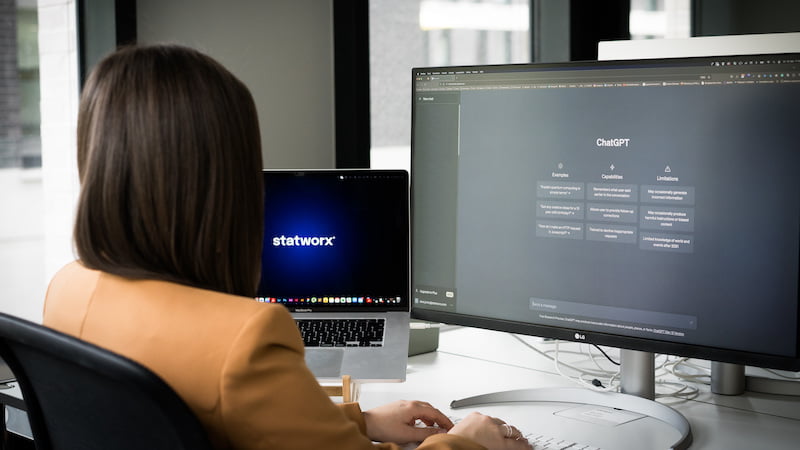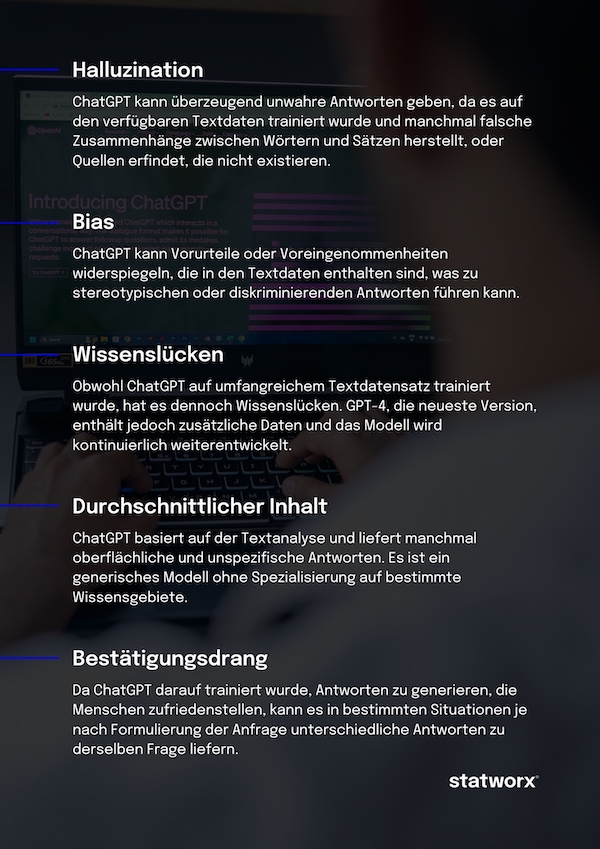
The use of ChatGPT in the work context offers many opportunities to make everyday work more efficient and productive. In order to get the most out of this AI-powered technology, it is important to recognize both the potentials as well as the limitations and risks of ChatGPT and act accordingly.
As one of the leading companies for data science and AI in the German-speaking region, statworx supports companies in unleashing the full potential of their data through the use of AI. In this article we will introduce you to some dos and don’ts that should help you to use ChatGPT responsibly and successfully in your everyday work.
Dos for using ChatGPT in a work context
1. Recognize potential in your own everyday work
ChatGPT offers versatile application possibilities in almost all areas. In order to be able to survive on the job market in the long term, it is therefore important to find out where ChatGPT can be integrated into your everyday work. In addition to gathering information, these can be various tasks:
- Writing, summarizing or correcting texts
- Proposing ideas and approaches to solving a wide variety of problems
- writing computer code
The targeted use of ChatGPT can save time and resources in everyday work.
2. Understand how it works and know its limitations
ChatGPT was built on a variety of text data. Information was stored and connections made in order to reflect the knowledge in the form of a conversation. This was accomplished by teaching ChatGPT two skills.
statworx
However, this process has also led to some limitations that need to be considered. Before ChatGPT is used in a corporate context, it is important that users understand these limitations in order to avoid potential risks for themselves and their company.

statworx
3. Write effective instructions
The quality of ChatGPT’s output can be significantly improved by adapting the input text – or prompt – to the task at hand. It is important to give clear and specific instructions. The better you explain something, the better the task at hand can be accomplished.
In addition, you can force ChatGPT to use more computing capacity. This can be achieved, for example, by instructing ChatGPT to explain the answer or provide dedicated solution steps.
Often, however, the first prompt does not directly lead to the desired result. The usual approach is then to iteratively adjust the prompt to achieve better results. There are many other ways to refine prompts.
Learn more about using ChatGPT effectively
Don’ts for using ChatGPT in a work context
1. Build dependencies
There is a possibility that ChatGPT may not be available in its current form in Germany or Europe in the future. This restriction could be due to an EU regulation, national German law or due to decisions made by those responsible at OpenAI.
Measures should be taken to ensure that we can continue to have an alternative. It is also important not to let ChatGPT or other models take over our analytical and critical thinking exclusively.
2. Enter sensitive and personal information
By using ChatGPT you agree to OpenAI’s privacy policy. In the free version, this allows OpenAI to view all data, pass it on to third parties and use it to further develop their models. The latter implies that, in principle, all conversations that you have with ChatGPT yourself become part of ChatGPT’s wealth of knowledge and could therefore be accessed by other users in the future through clever prompts or accidentally.
Under no circumstances should personal or company-internal data be uploaded in this mode. Recently, however, ChatGPT has offered the ability to restrict this through a feature called “Data Controls”. If this is activated, the conversations are not used for model training and can therefore no longer be accessed by others.
In addition, OpenAI states that it only stores the conversations for 30 days and only views them to prevent misuse and misconduct. However, we currently recommend not uploading any sensitive information until an enterprise-grade subscription is available.
3. Use ChatGPT for unethical or illegal purposes
When it comes to transformative technologies, everyone should think carefully about the impact the use of AI systems has on their own lives, on other people, or on society as a whole. ChatGPT must therefore not be used for unethical, harmful or illegal activities, such as spreading misinformation, conducting cyber attacks or promoting hatred and discrimination.
Use ChatGPT profitably in the company

statworx
As part of our free workshop “ChatGPT for Leaders”, which is aimed at management positions, on May 31, 2023, we will provide compact and immediately applicable specialist knowledge, offer the opportunity to discuss the opportunities and risks of ChatGPT with other managers and industry experts and use use cases to show how processes in the company can be automated.
Register for one of the limited workshop places
Source: https://www.basicthinking.de/blog/2023/05/24/dos-and-donts-chatgpt-im-arbeitskontext/


